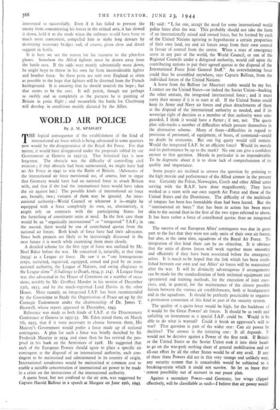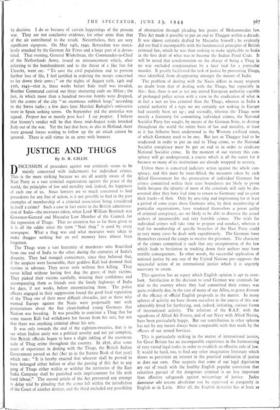WORLD AIR POLICE
By J. M. SPAIGHT
THE logical consequence of the establishment of the kind of international air force which is being advocated in some quarters now would be the disappearance of the Royal Air Force. For that matter, it would have disappeared under the proposals tabled by our Government at Geneva in 1932-33. That historical fact is now forgotten. The obstacle was the difficulty of controlling civil aviation ; if that obstacle had been surmounted, we might have had no Air Force in 1940 to win the Battle of Britain. (Advocates of the international air force mentioned are, of course, free to argue that Germany would have had no national force to attack Britain with, and that if she had the international force would have taken the air against her.) The possible kinds of international air force are, broadly, two ; variants of them may be ignored. An inter- national authority—World Council or whatever it is—might be equipped with a force completely its own, or, alternatively, it Blight rely on contracts with the participating States for the furnishing of constituent units at need. In the first case there would be an "organically international" or " integrated " I.A.F.; in the second, there would be one of contributed quotas from the national air forces. Both kinds of force have had their advocates. Since both projects are likely to be increasingly discussed in the near future it is worth while examining them more closely.
A detailed scheme for the first type of force was outlined by Mr. Noel Baker before the war. He conceived it, naturally, at that time (1934) as a League air force. He saw it as "one homogeneous corps, recruited, organised, equipped, armed and paid by an inter- national authority, the League of Nations, and owing allegiance to the League alone" (Challenge to Death, 1934, p. 214). A League force was also advocated in the House of Commons on a number of occa- sions, notably by Mr. Geoffrey Mander in his motion of December 13th, 1933, and by the much-regretted Lord Davies in the other
House. More recently an integrated I.A.F. has been recommended by the Committee to Study the Organisation of Peace set up by the Carnegie Endowment under the chairmanship of Dr. James T. Shotwell, whose report appeared in December, 1943.
Reference was made to both kinds of I.A.F. at the Disarmament Conference at Geneva in 1932-33. Mr. Eden stated there, on March 7th, 1933, that if it were necessary to choose between them, His Majesty's Government would prefer a force made up of national contingents. A plan for such a force was briefly sketched by Sir Frederick Maurice in 1934, and since then he has revived the pro- posal in his book on the Armistices of 1918. He suggested that each of the European Powers should agree to place a specific air contingent at the disposal of an international authority, each con- tingent to be maintained and administered in its country of origin. International aerodromes would be maintained at common cost to enable a suitable concentration of international air power to be made in a crisis on the instructions of the international authority.
A quota force, but not confined to the air arm, was suggested by Captain Harold Balfour in a speech at Margate on June 19th, 1943. Hz said: "I, for one, accept the need for some international world police force after the war. This probably should not take the form of an internationally raised and owned force, but be formed by each of the United Nations agreeing to hypothecate a certain proportion of their own land, sea and air forces away from their own control in favour of control from the centre. When a state of emergency arose in any part of the world, the World Council, or one of the Regional Councils under a delegated authority, would call upon the contributing nations to put their agreed quotas at the disposal of the International Force Joint General Staff." An overwhelming force could thus be assembled anywhere, says Captain Balfour, from the individual forces of the United Nations.
A horse from the Balfour (or Maurice) stable would be my bet. I cannot see the United States—or indeed the Soviet Union—backing the other entrant, the integrated international force ; and it must carry their money if it is to start at all. If the United States could keep its Army and Navy air forces and place detachments of them at the disposal of the international authority as needed, and if its sovereign right of decision as a member of that authority were safe- guarded, I think it would have a flutter ; if not, not. The quota plan side-tracks a number of difficulties which present themselves in the alternative scheme. Many of them—difficulties in regard to provision of personnel, of equipment, of bases, of command—could no doubt be overcome. But one big query would still remain. Would the integrated I.A.F. be an efficient force? Would its morale and its performance be up to the mark? No one can give a confident answer to that question. Morale in particular is an imponderable. To be dogmatic about it is to show lack of comprehension of its quality and importance.
Some people are inclined to answer the question by pointing to the high morale and performance of the Allied airmen in the present war. Certainly the Polish, Norwegian, Czech and other Allied units serving with the R.A.F. have done magnificently. They have worked as a team with our own superb Air Force and those of the United States and the Dominions. The difficulty of the multitude of tongues has been less formidable than had been feared. But the "international air force !' that has been in action has been more akin to the second than to the first of the two types referred to above. It has been rather a force of contributed quotas than an integrated one.
The success of our European Allies' contingents was due in great part to the fact that they were not only units of their own air forces, but also, at the same time, squadrons of the Royal Air Force. To integration of that kind there can be no objection. It is obvious that the units of divers forces will work together more smoothly and efficiently if they have been associated before the emergency arises. It is much to be hoped that the link which has been estab- lished between our own and our Allies' air forces will be maintained after the war. It will be distinctly advantageous if arrangements can be made for the standardisation of both technical equipment and operational and training methods, for the execution of joint exer- cises, and, in general, for the maintenance of the closest possible liaison between the various air establishments, both at headquarters and in the squadrons. It should be perfectly practicable to organise a permanent connexion of this kind as part of the security system.
The quality of a quota force would be high, for the backbone of it would be the Great Powers' air forces. It should be as swift and unfailing an instrument as a special I.A.F. could be. Would it be able to do what is wanted? Could it break an aggressor's will to war? That question is part of the wider one: Can air power be decisive? The answer is the irritating one: It all depends. It would not be decisive against a Power of the first rank. If Britain or the United States or the Soviet Union took it into their heads to go on the war-path nothing short of general mobilisation and an all-out effort by all the other States would be of any avail. If any of these three Powers did act in this very strange and nlikely way, any security system that is conceivable would be subjected to a breaking-strain which it could not survive. So let us leave that remote possibility out of account in our peace plan.
Against a secondary Power—and Germany, her wings clipped effectively, will be classifiable as such—I believe that air power would be decisive. I do so because of certain happenings of the present war. They are not conclusive evidence, for other arms than that of the air contributed to the result. Nevertheless, they are very significant signposts. On May 14th, 1940, Rotterdam was merci- lessly attacked by the German Air Force and a large part of it devas- tated. That evening, General Winkelman, the Commander-in-Chief of the Netherlands Army, issued an announcement which, after referring to the bombardment and to the threat of a like fate for Utrecht, went on: "To save the civil population and to prevent further loss of life, I feel justified in ordering the troops concerned to lay down their arms ; " on the nights of August 12th, 14th and r5th, 1943—that is, three weeks before Italy itself was invaded, Bomber Command carried out three shattering raids on Milan ; the last, in which more than a hundred two-ton bombs were dropped, left the centre of the city "an enormous rubbish heap," according to the Swiss radio ; a few days later Marshal Badoglio's emissaries were in Spain seeking terms. On September 3rd the armistice was signed. Propter hoc or merely post hoc? I say propter. I believe that history's verdict will be that those mid-August raids knocked Italy out of the war. Yet the fact that here, as also in Holland, there were ground forces waiting to follow up the air attack cannot be ignored. There is still virtue in an army with banners.























 Previous page
Previous page